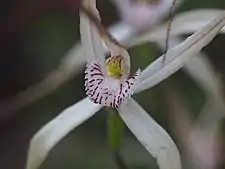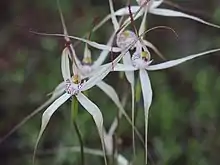Caladenia incensum
Caladenia incensum, commonly known as the glistening spider orchid is a species of orchid endemic to the south-west of Western Australia. It has a single, hairy leaf and three glistening white flowers which have a red-striped labellum.

| Glistening spider orchid | |
|---|---|
 | |
| Caladenia incensum growing near Gunyidi | |
| Scientific classification | |
| Kingdom: | Plantae |
| Clade: | Tracheophytes |
| Clade: | Angiosperms |
| Clade: | Monocots |
| Order: | Asparagales |
| Family: | Orchidaceae |
| Subfamily: | Orchidoideae |
| Tribe: | Diurideae |
| Genus: | Caladenia |
| Species: | C. incensum |
| Binomial name | |
| Caladenia incensum | |
| Synonyms[1] | |
Description
Caladenia incensum is a terrestrial, perennial, deciduous, herb with an underground tuber and which sometimes forms large colonies. It has a single erect, hairy leaf, 40–110 mm (2–4 in) long and 4–6 mm (0.16–0.24 in) wide. Up to three glistening white flowers 90–150 mm (4–6 in) long and 70–130 mm (3–5 in) wide are borne on a stalk 120–200 mm (5–8 in) tall. The sepals and petals spread widely near their bases but have long, drooping thread-like tips. The dorsal sepal is erect, 65–130 mm (3–5 in) long and 3–6 mm (0.1–0.2 in) wide. The lateral sepals and petals are 50–130 mm (2–5 in) long and 3–6 mm (0.1–0.2 in) wide with the petals slightly narrower than the lateral sepals. The labellum is 11–16 mm (0.4–0.6 in) long and 10–13 mm (0.4–0.5 in) wide and white, with radiating red lines, spots and blotches. The sides of the labellum have short, curved teeth, the tip is turned downwards and there are two rows of broad, anvil-shaped, white calli along its centre. Flowering occurs from late June to September.[2][3][4]
Taxonomy and naming
The glistening spider orchid was first formally described in 2001 by Stephen Hopper and Andrew Phillip Brown from a specimen collected in the Chiddarcooping Hill Nature Reserve north of Westonia and given the name Caladenia incensa. The description was published in Nuytsia.[1] In order that the genus and species names were of the same gender, the name was changed to Caladenia incensum.[5] The specific epithet (incensum) is a Latin word meaning "resinous material that yields a fragrant odour or smoke when burned"[6] referring to the sharp, burning metal odour of this orchid.[3]
The World Checklist of Selected Plant Families gives the name C. incensa but the Western Australian Herbarium lists this name as a spelling mistake.[7]
Distribution and habitat
The glistening spider orchid occurs between Hyden and Nerren Nerren Station, north of the Murchison River in the Avon Wheatbelt, Coolgardie, Geraldton Sandplains, Mallee, Murchison and Yalgoo biogeographic regions where it grows under shrubs on and near granite outcrops.[2][3][4][8]
Conservation
Caladenia incensum is classified as "not threatened" by the Western Australian Government Department of Parks and Wildlife.[8]
References
- "Caladenia incensa". APNI. Retrieved 11 February 2017.
- Jones, David L. (2006). A complete guide to native orchids of Australia including the island territories. Frenchs Forest, N.S.W.: New Holland. p. 105. ISBN 1877069124.
- Brown, Andrew; Dundas, Pat; Dixon, Kingsley; Hopper, Stephen (2008). Orchids of Western Australia. Crawley, Western Australia: University of Western Australia Press. p. 63. ISBN 9780980296457.
- Hoffman, Noel; Brown, Andrew (2011). Orchids of South-West Australia (3rd ed.). Gooseberry Hill: Noel Hoffman. p. 64. ISBN 9780646562322.
- "Caladenia incensa". FloraBase. Western Australian Government Department of Biodiversity, Conservation and Attractions.
- Brown, Roland Wilbur (1956). The Composition of Scientific Words. Washington, D.C.: Smithsonian Institution Press. p. 654.
- "Name Currency Caladenia incensa Hopper & A.P.Br". Western Australian Herbarium. Retrieved 7 February 2018.
- "Caladenia incensum". FloraBase. Western Australian Government Department of Biodiversity, Conservation and Attractions.